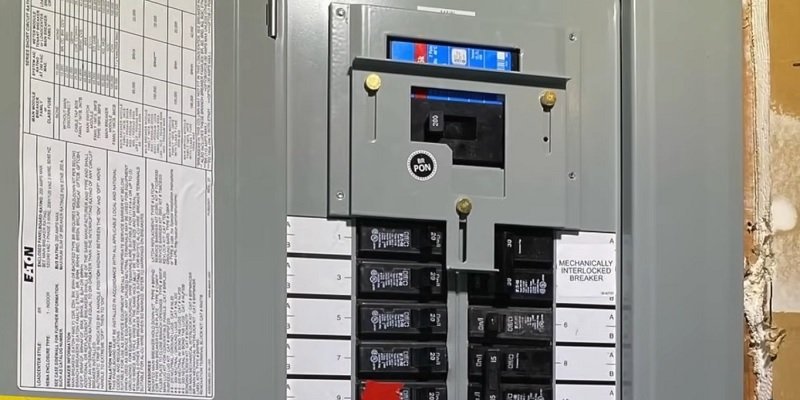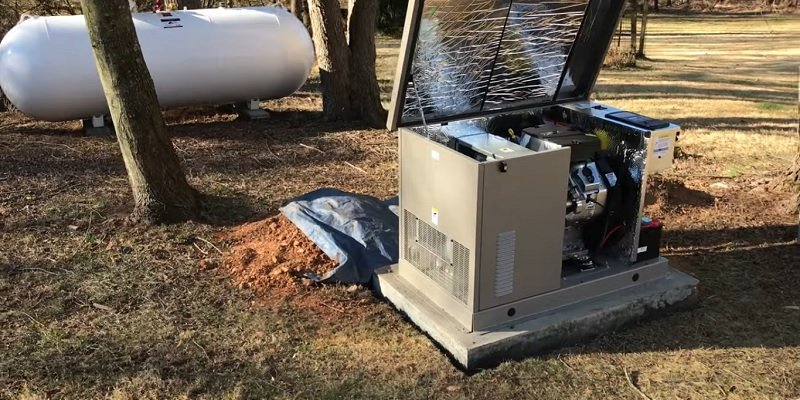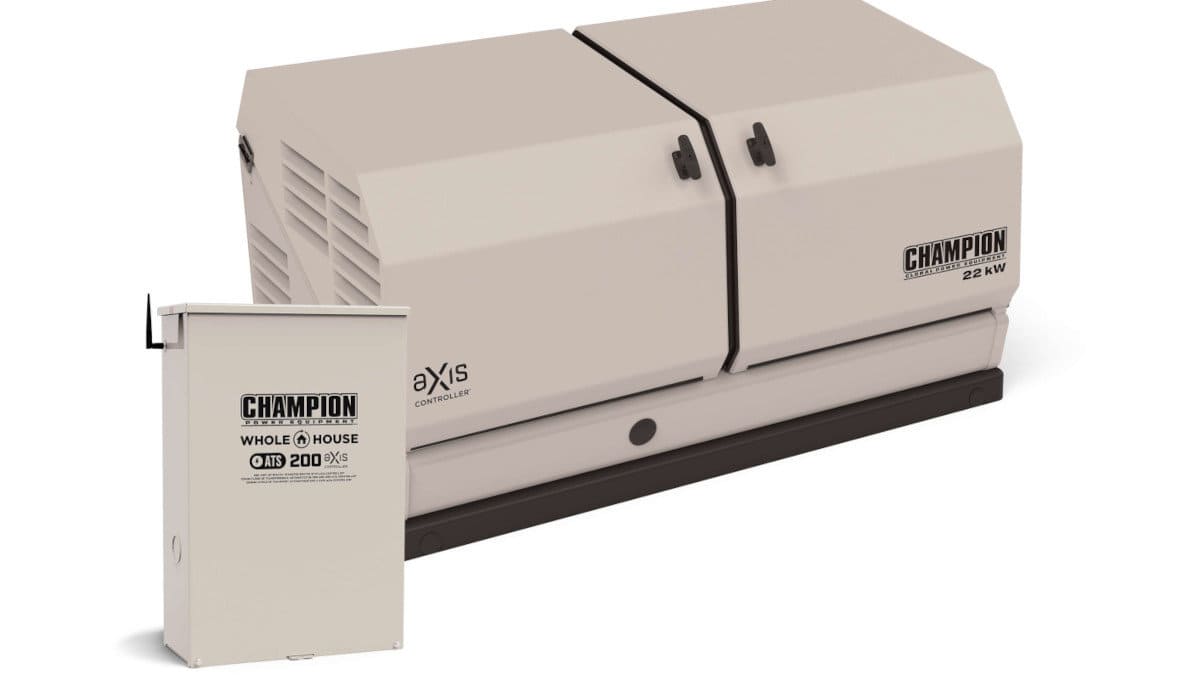Disclosure: This post contains affiliate links and I will be compensated if you make a purchase after clicking through my links. Learn More
For a 200 amp service, you typically need a generator with at least 15,000 to 20,000 watts. This ensures adequate power for essential systems and appliances.
Choosing the right generator size for a 200 amp service is crucial for maintaining uninterrupted power. A generator with 15,000 to 20,000 watts can handle the load of most homes with 200 amp service. This wattage range covers essential systems like heating, cooling, and major appliances.
By selecting an appropriately sized generator, you can ensure your home remains functional during power outages. Proper planning and understanding your power needs can prevent overloading and extend the life of your generator. Always consult with a professional to determine the exact requirements for your specific situation.

What Size Generator Do I Need for 200 Amp Service
Choosing the right generator size is crucial for your home. It ensures that your electrical needs are met safely and efficiently. When considering a generator for a 200 amp service, understanding generator sizing is essential.
Read Here: What size generator do I need for a 3 bedroom house
Importance Of Proper Sizing
Proper generator sizing helps prevent overloads and power outages. It ensures your generator can handle the electrical load of your home. An undersized generator can damage appliances and the generator itself.
On the other hand, an oversized generator wastes fuel and money. It is essential to balance your needs and the generator’s capacity. This way, you can ensure efficient and safe operation.
Common Misconceptions
One common misconception is that bigger is always better. People often think that a larger generator will cover all their needs. This is not true and can lead to unnecessary expenses.
Another misconception is that all generators are the same. Different generators have different capabilities and features. It is important to choose one that fits your specific needs.
| Misconception | Truth |
|---|---|
| Bigger is always better | Right size is crucial |
| All generators are the same | Different features and capacities |
Understanding 200 Amp Service
Understanding 200 Amp Service is crucial for selecting the right generator. This service is common in modern homes with high power demands. It’s essential to match the generator’s capacity to your 200 Amp service for optimal performance.

Basics Of 200 Amp Service
A 200 Amp service provides enough power for most homes. It can handle multiple high-energy appliances. This service includes a main panel that distributes electricity. It’s designed to support heavy loads without overloading.
| Component | Description |
|---|---|
| Main Panel | Distributes power to various circuits |
| Breaker | Protects circuits from overload |
| Service Wire | Brings electricity from the utility |
Homes with this service can run central air conditioning, electric heating, and large appliances. The 200 Amp service ensures there is enough power for modern conveniences.
Typical Applications
Many homes have a 200 Amp service. It supports multiple high-energy devices. Here are common applications:
- Central air conditioning units
- Electric water heaters
- Electric dryers and ovens
- Hot tubs and spas
- Home workshops with power tools
These applications require a reliable power source. A generator matched to a 200 Amp service ensures continuous operation during outages.
Choosing the right generator depends on the total power needs. Calculate the wattage of all appliances and devices. This helps in selecting a generator that can handle the load.
Factors Influencing Generator Size
Choosing the right generator for a 200 amp service can be tricky. Several factors can influence the size of the generator you need. Understanding these factors can help you make an informed decision.
Power Requirements
The first factor to consider is your power requirements. You need to know how much power your home consumes. Look at your electricity bills to find your average usage. This will give you a rough idea of your power needs. Generally, a 200 amp service home uses between 15,000 to 20,000 watts.
Here is a table to help you understand power usage for common appliances:
| Appliance | Average Wattage |
|---|---|
| Refrigerator | 600 watts |
| Air Conditioner | 3500 watts |
| Electric Oven | 5000 watts |
| Lights | 60-100 watts per bulb |
Starting Vs Running Watts
Another crucial factor is the difference between starting and running watts. Starting watts are the extra power needed to start an appliance. Running watts are the power needed to keep it running.
For instance, a refrigerator may need 1200 starting watts but only 600 running watts. So, you must consider both to avoid overloading your generator.
Here are some examples:
- Refrigerator: 1200 starting watts, 600 running watts
- Air Conditioner: 4500 starting watts, 3500 running watts
- Electric Oven: 8000 starting watts, 5000 running watts
By understanding your power requirements and the difference between starting and running watts, you can choose the right generator size for your 200 amp service. This ensures your home runs smoothly even during a power outage.
Calculating Your Power Needs
Calculating your power needs for a 200 amp service is crucial. It ensures you have enough power during an outage. This involves understanding what appliances you need and their wattage.
List Of Essential Appliances
Start by listing your essential appliances. These are items you can’t live without during a power outage. Common essential appliances include:
- Refrigerator
- Freezer
- Heating system
- Air conditioner
- Water heater
- Lighting
- Television
- Computer
Estimating Total Wattage
Next, estimate the total wattage of these appliances. Here is a table with typical wattage for each item:
| Appliance | Wattage |
|---|---|
| Refrigerator | 700 watts |
| Freezer | 500 watts |
| Heating system | 1500 watts |
| Air conditioner | 2000 watts |
| Water heater | 4500 watts |
| Lighting | 400 watts |
| Television | 300 watts |
| Computer | 250 watts |
Add up the wattage to find your total power needs. This will help you choose the right generator size for your 200 amp service.
Types Of Generators
Choosing the right generator for a 200 amp service can be challenging. There are different types of generators available. Each type has its own features and benefits. Below are the main types of generators you can consider.
Portable Generators
Portable generators are easy to move and set up. They are often used for temporary power needs. These generators can be useful during power outages or outdoor events. They typically run on gasoline, making them convenient for short-term use.
Here’s a quick overview of portable generators:
- Easy to transport
- Runs on gasoline
- Ideal for temporary power
- Cost-effective
| Feature | Description |
|---|---|
| Power Output | 5,000 to 10,000 watts |
| Fuel Type | Gasoline |
| Portability | High |
Standby Generators
Standby generators are installed permanently outside your home. These generators turn on automatically during a power outage. They are connected to your home’s electrical system. They can run on natural gas or propane, providing a more reliable power source.
Here are some key points about standby generators:
- Permanent installation
- Automatic start
- Connected to home’s electrical system
- Uses natural gas or propane
| Feature | Description |
|---|---|
| Power Output | 10,000 to 50,000 watts |
| Fuel Type | Natural gas or propane |
| Portability | None |
Generator Features To Consider
Choosing the right generator for a 200 Amp service involves considering key features. These features ensure you get the best performance and reliability. Let’s explore the essential generator features you should consider.
Fuel Type
Fuel type is crucial in selecting a generator. Different fuel types have their benefits and drawbacks.
- Gasoline: Readily available but has a shorter shelf life.
- Diesel: More efficient and long-lasting, but less available.
- Natural Gas: Continuous supply if you have a gas line. Not portable.
- Propane: Cleaner burning but requires storage tanks.
Noise Levels
Noise levels are important for home and neighborhood peace. Generators have different noise ratings.
| Generator Type | Noise Level (dB) |
|---|---|
| Portable | 60-70 |
| Standby | 50-65 |
| Inverter | 50-60 |
Choose a generator with a noise level that suits your environment.
Portability
Portability is essential if you need to move your generator. Consider the following:
- Wheels: Wheels make it easier to transport.
- Handles: Foldable handles offer better maneuverability.
- Weight: Lighter generators are easier to move.
Evaluate your need for portability before deciding.
Installation And Safety Tips
Installing a generator for a 200 amp service requires careful planning. Safety is crucial during this process. Follow these installation and safety tips to ensure your generator works well and safely.
Professional Installation
Hire a licensed electrician for the installation. They have the required skills and knowledge. They will install the generator correctly and safely.
Check local codes before starting the installation. Ensure compliance with all regulations. This helps in avoiding fines and ensuring safety.
Install a transfer switch. This device switches the power source from the grid to the generator. It prevents backfeeding, which can be dangerous to utility workers.
Place the generator in a well-ventilated area. This avoids the buildup of harmful gases like carbon monoxide. Never install a generator inside your home or garage.
Regular Maintenance
Perform regular maintenance on your generator. This ensures it runs smoothly and lasts longer.
- Check the oil levels regularly. Refill as necessary.
- Inspect the air filter. Clean or replace it to ensure proper airflow.
- Test the generator monthly. Run it for about 30 minutes to keep it in good condition.
Keep the generator clean and dry. Protect it from dust and moisture. This helps in maintaining its efficiency.
Schedule an annual inspection by a professional. They can identify and fix potential issues. This ensures your generator stays reliable.
| Task | Frequency |
|---|---|
| Check oil levels | Monthly |
| Inspect air filter | Quarterly |
| Test generator | Monthly |
| Annual inspection | Yearly |
Top Generator Recommendations
Choosing the right generator for a 200 amp service can be tricky. It depends on whether it’s for residential or commercial use. Below are some top generator recommendations to help you make an informed decision.
Best For Residential Use
For home use, it’s important to have a reliable generator. Here are a few top choices:
Generac Guardian 22kW: This generator is perfect for homes. It offers automatic backup power. It runs on natural gas or liquid propane.
Champion 12.5kW Home Standby: This model is budget-friendly. It is also very reliable. It provides enough power for most household needs.
Kohler 20RESCL-200SELS: Known for its durability. It can power large homes effortlessly. It is also user-friendly.
Best For Commercial Use
Commercial establishments require more power. Here are the best options:
Caterpillar XQ230: This generator is powerful. It is ideal for small to medium businesses. It has a robust build.
Cummins C200D6RG: Known for reliability. It offers excellent performance. It is also fuel-efficient.
KOHLER 200REZXB: This model is great for large businesses. It provides consistent power. It is also easy to maintain.
Choosing the right generator is essential. It ensures you have power when you need it most. Consider these options to make the best choice.
Cost Considerations
Choosing the right generator for a 200 amp service involves understanding various costs. These costs can be broadly categorized into initial investment and operational costs. Knowing these will help make a well-informed decision.
Initial Investment
The initial cost of a generator varies. It depends on the brand, power capacity, and features. A generator suitable for 200 amp service usually costs more. You might expect to spend between $3,000 to $10,000 on a quality generator.
Here’s a quick breakdown:
| Type | Average Cost |
|---|---|
| Portable Generator | $3,000 – $5,000 |
| Standby Generator | $5,000 – $10,000 |
Portable generators are cheaper but less powerful. Standby generators are more expensive but offer higher power and convenience.
Operational Costs
Operational costs include fuel, maintenance, and repairs. Understanding these costs helps in budgeting effectively.
- Fuel: Generators can run on diesel, propane, or natural gas. Diesel is costlier but efficient. Propane and natural gas are cheaper but less efficient.
- Maintenance: Regular maintenance is crucial. It ensures the generator runs smoothly. Expect to spend around $200 to $500 annually.
- Repairs: Over time, parts may need replacement. Budget for unexpected repairs to avoid surprises.
Here’s a quick glance at fuel costs:
| Fuel Type | Cost Per Gallon |
|---|---|
| Diesel | $3 – $4 |
| Propane | $2 – $3 |
| Natural Gas | $1 – $2 |
Choosing the right generator involves balancing initial and operational costs. Understanding these factors helps in making a smart investment.

Frequently Asked Questions
What Size Generator For 200 Amp Service?
A 15-20 kW generator is typically suitable for 200 amp service.
How To Calculate Generator Size For 200 Amp?
Calculate by adding the wattage of all appliances and consider a 20-25% buffer.
Is 22kw Generator Enough For 200 Amp?
Yes, a 22kW generator can handle 200 amp service efficiently.
Related: How Much Propane does a 22kw generator use?
Do I Need A Transfer Switch For 200 Amp Service?
Yes, a transfer switch is essential for safely connecting a generator to a 200 amp service.
Final Words
Choosing the right generator size for a 200 amp service is crucial. Consider your power needs, budget, and efficiency. A properly sized generator ensures seamless electricity during outages. Always consult a professional for accurate recommendations. Investing in the right generator guarantees peace of mind and reliable power supply.


